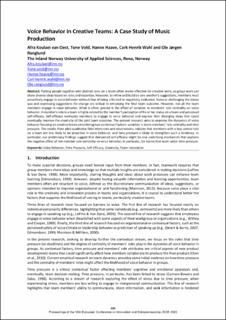Voice Behavior in Creative Teams: A Case Study of Music Production
Koulaei, Afra; Vold, Aud Tone; Haave, Hanne Marit; Wahl, Carl-Henrik; Ranglund, Ole Jørgen Stefferud
Peer reviewed, Journal article
Published version
Permanent lenke
https://hdl.handle.net/11250/3107343Utgivelsesdato
2023Metadata
Vis full innførselSamlinger
Originalversjon
Proceedings of the European Conference on Innovation and Entrepreneurship, ECIE. 2023, 18 (1), 486-492.Sammendrag
Putting people together with distinct roles on a team often seems effective for creative work, as group work can share diverse ideas based on roles and expertise. However, to refine and build on one another's suggestions, members must proactively engage in voice behavior without fear of being criticized or negatively evaluated. Voice or challenging the status quo and expressing suggestions for change are critical in enhancing the final team outcome. However, not all the team members engage in voice behavior. What is often ignored is the effect of variation in members' role centrality on voice behavior. A member's role in a team is highly related to the member's perception of his or her status on a team and perceived self-efficacy. Self-efficacy motivates members to engage in voice behavior and express their diverging ideas that could eventually improve the creativity of the joint team outcome. The present research aims to examine the dynamics of voice behavior focusing on creative teams considering two contextual factors: variation in team members' role centrality and time pressure. The results from pilot qualitative field interviews and observations indicate that members with a less central role on a team are less likely to be proactive in voice behavior, and time pressure is likely to strengthen such a tendency. In particular, our preliminary findings suggest that dampened self-efficacy might be one underlying mechanism that explains the negative effect of low member role centrality on voice behavior, in particular, for teams that work under time pressure.

